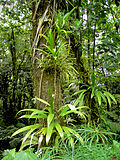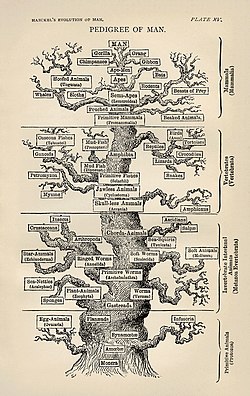
Back بوابة:علم البيئة Arabic Portal:Ecologia Catalan Portal:Økologien Danish Portal:Ecología Spanish درگاه:بومشناسی Persian Portail:Écologie French 포털:생태학 Korean Портал:Екологија Macedonian Portal:Ecologia Portuguese Portal:Ecologie Romanian
| |
|
|
Ecology
|
|
Ecology (from Ancient Greek οἶκος (oîkos) 'house' and -λογία (-logía) 'study of') is the natural science of the relationships among living organisms and their environment. Ecology considers organisms at the individual, population, community, ecosystem, and biosphere levels. Ecology overlaps with the closely related sciences of biogeography, evolutionary biology, genetics, ethology, and natural history. Ecology is a branch of biology, and is the study of abundance, biomass, and distribution of organisms in the context of the environment. It encompasses life processes, interactions, and adaptations; movement of materials and energy through living communities; successional development of ecosystems; cooperation, competition, and predation within and between species; and patterns of biodiversity and its effect on ecosystem processes. Ecology has practical applications in fields such as conservation biology, wetland management, natural resource management, and human ecology. The word ecology (German: Ökologie) was coined in 1866 by the German scientist Ernst Haeckel. The science of ecology as we know it today began with a group of American botanists in the 1890s. Evolutionary concepts relating to adaptation and natural selection are cornerstones of modern ecological theory. Ecosystems are dynamically interacting systems of organisms, the communities they make up, and the non-living (abiotic) components of their environment. Ecosystem processes, such as primary production, nutrient cycling, and niche construction, regulate the flux of energy and matter through an environment. Ecosystems have biophysical feedback mechanisms that moderate processes acting on living (biotic) and abiotic components of the planet. Ecosystems sustain life-supporting functions and provide ecosystem services like biomass production (food, fuel, fiber, and medicine), the regulation of climate, global biogeochemical cycles, water filtration, soil formation, erosion control, flood protection, and many other natural features of scientific, historical, economic, or intrinsic value. (Full article...) Selected article - Species reintroduction is the deliberate release of a species into the wild, from captivity or other areas where the organism is capable of survival. The goal of species reintroduction is to establish a healthy, genetically diverse, self-sustaining population to an area where it has been extirpated, or to augment an existing population. Species that may be eligible for reintroduction are typically threatened or endangered in the wild. However, reintroduction of a species can also be for pest control; for example, wolves being reintroduced to a wild area to curb an overpopulation of deer. Because reintroduction may involve returning native species to localities where they had been extirpated, some prefer the term "reestablishment". Humans have been reintroducing species for food and pest control for thousands of years. However, the practice of reintroducing for conservation is much younger, starting in the 20th century. (Full article...) Selected image - Credit: User: Lamiot General imagesThe following are images from various ecology-related articles on Wikipedia.
Related WikiProjectsThings you can do
Entries here consist of Good and Featured articles, which meet a core set of high editorial standards.
 In evolutionary biology, mimicry is the evolved resemblance of an organism to something else, often another organism of a different species. Mimicry may evolve between different species, or between individuals of the same species. In the simplest case, as in Batesian mimicry, a mimic resembles a model, so as to deceive a dupe, all three being of different species. A Batesian mimic, such as a hoverfly, is harmless, while its model, such as a wasp, is harmful, and is avoided by the dupe, such as an insect-eating bird. Birds hunt by sight, so the mimicry in that case is visual, but in other cases mimicry may make use of any of the senses. Most types of mimicry, including Batesian, are deceptive, as the mimics are not harmful, but Müllerian mimicry, where different harmful species resemble each other, is honest, as when species of wasps and of bees all have genuinely aposematic warning coloration. More complex types may be bipolar, involving only two species, such as when the model and the dupe are the same; this occurs for example in aggressive mimicry, where a predator in wolf-in-sheep's-clothing style resembles its prey, allowing it to hunt undetected. Mimicry is not limited to animals; in Pouyannian mimicry, an orchid flower is the mimic, resembling a female bee, its model; the dupe is the male bee of the same species, which tries to copulate with the flower, enabling it to transfer pollen, so the mimicry is again bipolar. In automimicry, another bipolar system, model and mimic are the same, as when blue lycaenid butterflies have 'tails' or eyespots on their wings that mimic their own heads, misdirecting predator dupes to strike harmlessly. Many other types of mimicry exist. (Full article...) Selected biography -Aparajita Datta (born 1970) is an Indian wildlife ecologist who works for the Nature Conservation Foundation. Her research in the dense tropical forests of Arunachal Pradesh has successfully focused on hornbills, saving them from poachers. In 2013, she was one of eight conservationists to receive the Whitley Award. She is also a Co-Chair of the IUCN Hornbill Specialist Group. (Full article...) Did you know (auto-generated)
Selected quote -
Ecology news
Additional News Highlights
Selected publication -The Journal of Wildlife Management is a peer-reviewed scientific journal devoted to the ecology of non-domesticated animal species. It is published by The Wildlife Society. (Full article...) Related portalsMore did you know -Related articlesAssociated WikimediaThe following Wikimedia Foundation sister projects provide more on this subject:
Web resourcesPreview warning: Page using Template:Div col with unknown parameter "1 = 2"; use colwidth= to specify column size
Discover Wikipedia using portals |
© MMXXIII Rich X Search. We shall prevail. All rights reserved. Rich X Search














































